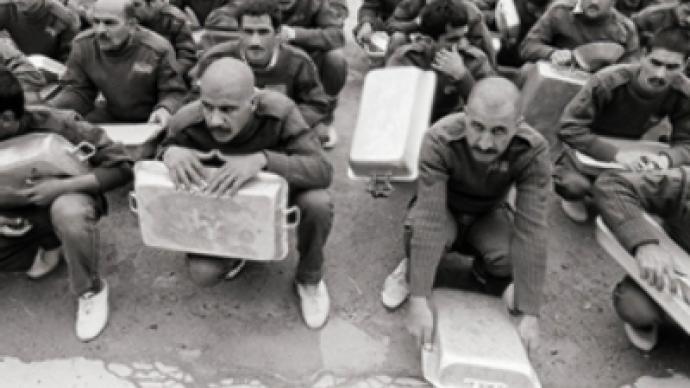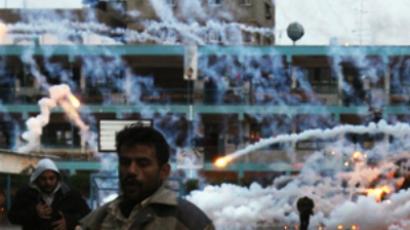Spin-a-War: Iran’s rocky road in and out of the Axis of evil

The Forgotten War
The war between Iran and Iraq in 1980 – 88 is a conflict which, as it seems, international media spin had no effect at all, apart from ignoring it for most of its duration; ignoring to the extent of totally forgetting about it for months, sometimes years in a row. They call that war ‘the forgotten war.’ But from our vantage point in 2009 this definition looks wrong.
Aged Spin is Stronger
Political and media spin, in fact, accompanied that conflict from day one till the last day. It was not as much connected with the actual progress of the war but with the roles allocated to Iran and Iraq by the U.S.-led Western world on one side and the Soviet Union-led Socialist camp on the other. Another factor, important in the game, was the pressure of the ambitions of the leaders of the two sides in the war: Ayatollah Khomeini and Saddam Hussein.
The main results of the twenty-to-thirty-year-old spin are the respective niches currently occupied by both countries in the regional power setup and the informational mess in which we have to dig to find background information. The places on or close to the Axis of Evil were also secured for both countries by that old and not quite dead spin.
Let’s take the Iranian nuclear program as an example. It had started long before the Islamic revolution, and at the beginning had been gladly and openly supported by the United States of America. After the fall of the Shah’s regime the program lay frozen until it was picked up again by the Islamic Revolutionary Guards. It happened long after the hostage drama at the U.S. embassy had sealed the image of Iran as an evil nation willing to hurt and harm America. So the Iranian nuclear program, peaceful or not, had no option but to become a tool of evil in the eyes of the Western world.
Contrary to the American kind of foreign policy, Russian diplomacy never saw ideology, even Marxist ideology in Soviet times, as a torch in its hands, shedding light on the Asian road we were traveling. Roughly two hundred years before the U.S. embassy crisis, Russia had an embassy crisis of its own in Tehran: a crowd stormed into the grounds of the Russian Imperial mission and tore the Ambassador, Alexander Griboyedov, who was also famous as a playwright, into small pieces. For a certain period during his execution the Ambassador remained alive.
Russia’s reaction was harsh and quick. But I am not going to describe it here beyond the fact that the Russian Empire retaliated against the people directly responsible for that hideous crime but never put Iran (Persia of the time) on any permanent dung list. There was no such thing as an Axis of Evil or a simplistic notion that some nation as a whole may be evil. Russia’s idea of righting the wrongs done to Russia in the East was a fast and intimidating show of force, after which there was punishment for the guilty, bribes for the mighty and, usually, another ‘unbreakable eternal alliance and friendship’ until the next offence.
Russia, as much as Britain, believed (and to a large extent still believes) that in the East there are only three things by which one can earn respect: power (and wealth as its cause or consequence), wisdom and poetry; but power comes first.
Ignoring Absurdity as a Way of Seeing No Evil
The U.S. policy in the Middle East and Central Asia is, on top of oil and other strategic interests, based on ideology. Before the Islamic revolution, Iran under the Shah was a tool in the Israeli-American plan of reorganizing the Middle East.
The Islamic revolution cancelled the original plan but didn’t affect the ideology behind it. Iraq quickly replaced Iran as a recipient of U.S. assistance and client of the U.S. defense industrial complex, and even the total impossibility of neutral, to say nothing of friendly, relations between Iraq and Israel, was for a time forgotten.
The situation that resulted was completely absurd from the point of view of common sense. America simultaneously supported the Islamic militants fighting Soviet troops in Afghanistan and helped secular Iraq in its war with the Islamic republic of Iran which was at the moment doing the same thing as the U.S. in Afghanistan: supporting the Islamic militants against the Soviet Union.
That is the main reason, I think, why the Western media spin on the Iran-Iraq war came in the form of a near total silence about that conflict. Spin, as we know, usually operates clear-cut categories of black and white where the real picture has many more colors and shades. In the case of the Iran-Iraq war seen against the background of the war in Afghanistan, much more important for the outcome of the global conflict of the time was the Cold War, finding enough of either of the two ‘basic’ colors to paint any picture at all was nearly impossible.
The spin worked, as it usually does, both ways. Media spin is sometimes like scientific experiment with clear, immediate results and a vague long-term aftermath. The Western public swallowed it whole, with just a few exceptions. In the Soviet Union the public dismissed Western policies as another example of ‘rule and divide’ while seeing the efforts of Iran for what they were: attempts to become the first major Islamic power of the 20th Century and to gain influence over all other Islam-practicing nations in the region, secular and theocratic alike.
From the point of view of the Islamic fighters in Afghanistan and the theoreticians of militant Islam in Saudi Arabia, Egypt and Iran the policy of the West looked clearly two-faced and pharisaic. For them there was no secret that America and its allies help the Mudjaheddin only out of their special interest in countering everything that came out of the Soviet Union and not because they understood and defended freedom as a universal notion that includes the right of Islamic peoples to form a theocratic state if they want.
The only freedom that the official U.S. ideology allows is freedom as it is understood in America. Many Americans fought for it in good faith in many overseas wars of the last century. Many genuinely believe that the American way of life is the best in the world and that everyone in the world wants to live like an American. But this view is not very typical for the Moslems of Afghanistan or Iran; they have their own understanding of freedom.
The Chemical Spin and the Spoils of War
As soon as the Cold War ended and Soviet troops were withdrawn from Afghanistan the temporary alliance was broken. The Iran-Iraq war ended approximately at the same time, give or take a few months. The spin, as is usually the case, didn’t. Time came to go back to the original Israeli-centered plan for the Middle East, and new enemies had to be defined and earmarked for slaughter.
Hence the fierce discussion, or rather a clash, over the use of chemical weapons by Iraq during the Iran-Iraq war, in the U.S. and British media in the fall of 1988. One side was saying that Iraq is an evil nation ruled by a monster who uses mustard gas against his enemies in the battlefield and then poisons his own citizens of Kurdish origin with the same substance.
The other side was saying that there is no hard evidence of the use of chemical weapons at all as all Kurdish refugees arrived in Turkey without any signs of the effects of the gas and the use of gas on certain villages is justified because they were on the front line when the war was still going on, and that some of the people bombed and shelled in those villages were members of anti-government militias that had assisted the Iranian forces during the war – in other words, traitors.
The efforts of both sides in the discussion caused the image of Iraq, a successful secular state before the war, to become that of an aggressor, unscrupulous about the means it uses to reach its ends. In a few years this new image led to the first Gulf war and further to the war of 2003, Saddam’s execution and the chaos that rules in Iraq in our time.
Iran came out a political and ideological winner of the war with Iraq in which the Western world recognized no winners. Iran gained extra influence over the Iraqi Shiite majority and a moral mandate to assist it in its struggle against Sunni domination. Iran became a winner in one more sense: in the following years the U.S., driven by its own purpose, waged war on its former allies: Iran’s Saddam Hussein and the Taliban, a movement founded by the Mudjaheddin who had been living for years on U.S. support during the war in Afghanistan.
By eliminating Iran’s enemies, America cleared the field for Iran to grow into the most influential state in Central Asia. It is interesting how anti-Iran spin went on all the time while U.S. soldiers were taking Baghdad or driving the Taliban out of Kabul. This whole package of double standards and hypocrisy allowed the leaders of Iran to call the U.S. efforts in the Middle East and Central Asia ‘a crusade’ against Islam. That word has ever since been often used by the hard core militants like Osama Bin Laden, the leaders of the Taliban, even by the separatists in Southern Russia.
The total unplanned and unwanted sum of U.S. efforts in the Middle East and Central Asia in the past three decades may be described in two phrases: ‘the colossal upsurge of militant Islamic extremism’ and ‘the rise of Iran as a theocratic regional superpower.’ The U.S. and the rest of the world are fighting an uphill battle against the former and hope against hope that there will be no war with the latter.
The New Phase
A new phase begins at this moment for Iran: its slow exit from the Axis of Evil. The U.S. may go back to the original plan of the 1950-60s when Iran was seen as an ally. But it won’t happen over night. In fact, the balance between Iran as enemy number one in Central Asia and Iran a U.S. ally is so subtle that it still may shift either way.
In September the U.S. military was technically and tactically ready for a strike on Iran. The strike never happened, most probably because common sense prevailed: a third ongoing war on top of another two is no one’s idea of fun. Now there are clear signs that the U.S. is ready for direct negotiations with Iran. But something tells me that in Washington there are still many who would rather have Americans looking at Iranians through optical gun-sights than across the negotiating table.
Objectively speaking, the U.S. now needs Iran as an ally or at least very much as a neutral state. The withdrawal from Iraq carries consequences that call for the use of Iranian influence over the country’s Shiite majority. In Afghanistan, the U.S. and the allied forces would be better off with Iranian clerics openly on their side against the Taliban.
At the moment, the U.S. – Iraq – Iran – Afghanistan knot looks like a riddle we have in Russia: how you get a wolf, a goat and a cabbage safely across a river if you only have one boat?
Most probably, the balance will shift towards an improvement in U.S. – Iranian relations. It is still too early for an alliance. The road has to be paved by months of Iran-friendly media spin first. If such spin starts in earnest it would mean that the riddle had been solved. All the rest will only be a matter of time.
Evgeny Belenkiy, RT













